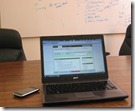Having constant connectivity with technology (Laptops, iPads, and Smart phones) in meetings can be a powerful tool when you need to lookup KPIs on the spot, share a web based product demo, or do a group review of an important document. But, these same technologies can also act as a distraction to your meeting participant.
phones) in meetings can be a powerful tool when you need to lookup KPIs on the spot, share a web based product demo, or do a group review of an important document. But, these same technologies can also act as a distraction to your meeting participant.
When is it ok to have technology in meetings?
Before we dive into the topic, think about the following three question in relation to your organization:
- Are there ground rules for the appropriate usage of technology in meetings at your organization?
- If people at your company were more technologically disconnected, would they be more attentive in the meetings in which they are participating?
- Would your meetings be more effective and shorter if everyone were fully engaged for the duration of the meeting?
A simple rule of thumb for when it’s OK to use technology in meetings:
“If what you are doing is more important than the meeting topic, then it should be ok to work on that task or send that email during the meeting”
BUT… evaluating the logic of this rule: “should you even be in the meeting if you have a more critical task that needs your full undivided attention?”
The following are a few guiding principles that we recommend if you are participating in a meeting:
- Turn off all sound (including vibration).
- Don’t take phone calls in the room. If you have to take a call, get up and leave the meeting, then take the call in a hallway.
- If you have to use your technology in a meeting, let the meeting organizer know upfront.
- Never, ever, ever play games or surf facebook in a meeting.
- If you do take notes on your computer (a legitimate reason to have a laptop in meetings), share them with the meeting organizer after the meeting.
- If you have a more important task to do and you aren’t critical to the meeting, don’t go.
If you are organizing the meeting:
- Set ground rules before the meeting starts.
- Assign a note taker, and let everyone else know. A sneaky trick is to assign note taker to whoever has their laptop open when the meeting starts. Do this a few times, and people will stop having their notebooks open during a meeting.
- Let people know that you respect their time and would like to keep the meeting as short as possible, let them know that their attention is important to the value of the meeting.
Let us know your ideas and suggestions for how to manage appropriate technology use in meetings.



